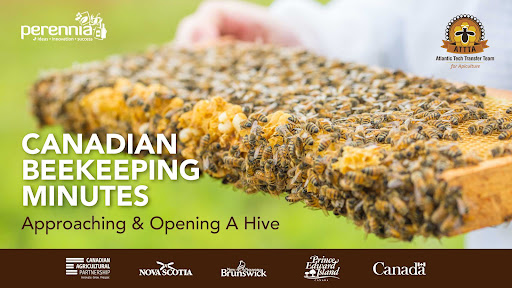Well, we are heading into the end of October and, looking back on the 2021 season, it has definitely been an interesting year for Maritime beekeepers and blueberry growers alike. This week we are sharing some insights on the 2021 blueberry harvest from our provincial blueberry specialists. Keep following below to find out what we know so far about this year’s blueberry harvest in Prince Edward Island, Nova Scotia, and New Brunswick.
This week, we are also excited to announce the upcoming launch of “Canadian Beekeeping Minutes”, ATTTA’s own video series of introductory beekeeping demonstrations. Keep reading for more details and release dates!
Provincial Blueberry Updates
Prince Edward Island
“The wild blueberry yield this year on PEI is estimated to be a little above 19 million pounds. This is about the yield we’ve been getting for several years now from Island blueberry fields. I was expecting a higher yield due to decent pollination and the great growing weather we had this summer (plenty of rain and sunshine compared to last summer’s drought). However, due to a June frost, and the dry weather we had in 2020 which would have affected the sprout field’s ability to set ample fruit buds, our yield was not anything of a bumper crop.”
- Cameron Menzies (PEI Dept. Agriculture & Land)
Nova Scotia
“This year, we had a great production year in Nova Scotia. This past winter was warmer, and we observed minimal winter damage on blueberry stems in the spring. The season started early with early flower bud development in crop fields. The growing degree models indicated that we were well ahead of the last fivers in mid-April. This lack of frost in the ground and drier conditions have also led to increased soil temperature, which all contributed to the early development of the F2 flower bud stage in the lowbush blueberry fields in NS. We had a low mummy berry infection year due to cooler temperatures and dry conditions during the infection period. This season’s growing condition also provided good pollination on wild blueberry plants. The frost event in early June had influences on flowers and pollination, but the damage was not serious and only limited to few late development areas. The harvesting period went well, but a few wet periods and storms had delayed harvesting and might have caused yield loss. Overall, the season went well, and many wild blueberry growers are happy with the season and yield. Last year, we had about 36 million lbs. produced in NS under the drought influence, and we are expecting a higher yield this year. We don’t have the final number for the province yet, but we are looking at around 50 million lbs. The blueberry market is strong, and we are also optimistic about the price.”
- Hugh Lyu (Perennia Food and Agriculture Inc.)New Brunswick
“The wild blueberry crop is estimated to range from 55 to 60 M lbs. The drought of 2020 reduced the total number of fruit buds per plant going into the winter. Very little winter damage was observed in the spring (5 to 10% in certain fields). In mid to late spring, a frost event occurred causing flower damage, mostly in Northeastern NB, although damage was visible in southern NB fields. Despite the low number of fruit buds and flowers, pollination weather was excellent. The information provided by most growers is that honey bees were at or above the written guideline for blueberry pollination. The weather during bloom resulted is a high fruit set for fields with adequate pollinators. A reasonable yield was observed by most growers. Harvest period was about a week earlier than in previous years and was drawn out over 4 to 5 weeks to skilled labour operators. It was also noted that Spotted Wing Drosophila (SWD) was severe in the last field harvested.”
- Michel Melanson (NB Dept. Agriculture, Aquaculture and Fisheries)Canadian Beekeeping Minutes – Presented by ATTTA
Canadian Beekeeping Minutes is a series of short videos that
demonstrate how to perform some key introductory beekeeping techniques and
tasks. These demonstrations are intended for beekeepers at the beginner level
and are meant to provide quick and simple directions following best management practices
for the management of honey bee colonies in Atlantic Canada. The first
demonstration of the series will be released next Wednesday (October 27th,
2021), followed by subsequent demonstration video releases every other
Wednesday. So, make sure to mark those bi-weekly Wednesdays on the calendar and
we hope you enjoy!
Demo video 1 release date: Wednesday October 27th, 2021
Connecting with ATTTA Specialists


